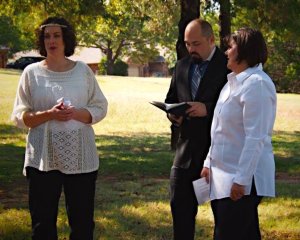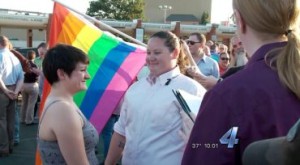Over at Secular Okie my good friend Brenda has a new post up about how secular groups should react to Oklahoma’s HB1125, which I commend to your reading now. Here is a teaser:
Recently members of the secular community here in Oklahoma, many of them our leaders, have been reminding us that they are ordained in the state, authorized to perform marriages as an ordained “minister” under Oklahoma law, and are willing to do so for non-believers. They, along with several churches and religious leaders, have been doing this in response to recent legislation and made it clear that they will perform marriage ceremonies for atheists in order to allow us the opportunity to comply with this bill.
I have three words for my leadership:
CUT IT OUT.
Read the rest, please, before proceeding to my reply below.
I don’t know whether Brenda was directing this at me, but I’m at least as guilty as others of pointing out that we have plenty of devoutly secular celebrants here in the OKC metro area including myself, my fellow SINner Caleb Lack, and this colorful character. The State of Oklahoma does not (and legally cannot) differentiate between sects when it comes to officiating wedding ceremonies: Christian ministers, Jewish rabbis, Muslim imams, Buddhist priests, Mormon lay ministers, Secular Humanist celebrants, and openly atheist FFRF officiants receive equal standing before the law, as well they should. This was true prior to the introduction of HB1125, and the bill does nothing to change it, either in its original or amended form.

Leaders and others in the secular community should aggressively take advantage of this situation, file the necessary paperwork, and marry as many secular people as desire to be married in a public and secular solemnization ceremony. Secular officiants are not “pretend religious leaders” here to “perform pseudo-religious ceremonies for non-believers” but rather we are servants of the secular community, who voluntarily perform fully authentic solemnization ceremonies, both legally and morally binding, in which participants take their vows just as seriously as religious people, despite (or perhaps because of) having the freedom of conscience to craft their own. We are not “patting ourselves on the back about how we’ve fooled the powers that be” but rather we are demanding equal treatment under the law and providing a service to those members of the secular community who choose to mark this particular life change with a public ceremony.

As to those who do not choose formal ceremony, regardless of whether they identify as secular or religious, surely they should continue to be afforded the opportunity to contract their wedding before a state judge. The original version of HB1125 had language “deleting requirement that judge solemnize marriage” and this was, of course, intended as the thin edge of a theocratic wedge. The current version of the bill lacks those changes, but it remains a steaming pile of useless dreck, intended as a first step in outsourcing civil marriage to the churches, and must be opposed by secularists as such.
It has to be noted here that many hardcore separationists in the U.S. have pretty much given up on fully separating church and state in this area, even though it is one of the only ways in which existing state laws explicitly empower clergy to act as agents of the state. Mary Anne Case explained the history of this bizarre conflation of civil and ecclesiastical authority in an excellent lecture to the University of Minnesota Law School:
It may seem a paradox that the United States, with a much greater commitment to separation of church and state, conflates civil and religious marriage to a far greater extent than some continental European countries in which church-state cooperation is constitutionally secured. In Germany, for example, despite a long and continuing history of close cooperation between church and state on many matters, civil and religious marriage are kept rigorously separate by law. Only civil marriage has the force of law and it may be performed only by a civil registrar. German couples are free to have an entirely separate religious ceremony performed by clergy, but, this ceremony has no legal effect under German law. The peculiar U.S. situation in which members of the clergy, as authorized agents of the state, can virtually simultaneously and seamlessly perform a ceremony of religious and civil marriage and the resulting conflation of religious and civil marriage create many difficulties and confusions under U.S. law. As suggested above by the discussion of Lord Hardwicke’s Act, which not only asserted for the first time the state’s monopoly over marriage, but did so in conjunction with the Established Church of England, the roots of the American conflation between religious and civil marriage lie deep in Anglo-American legal history.
The U.S. was founded as the world’s first secular republic, but centuries later we still have yet to shake off all the vestiges of our Anglican cultural ancestry. But what would a fully secular solution look like? Ed Brayton has an idea:
Marriage is a legal contract and should be taken completely out of the hands of the clergy. In order to be married, all you should have to do is get a license, sign it and file it with the government. If you then want to have a ceremony, regardless of whether it is a religious one or not, you can then do that, but the person who solemnizes or performs that ceremony should have nothing to do with whether the marriage is legally recognized or not.
He is correct, of course, but herein lies the dilemma. One solution to the marriage problem is to demand religious neutrality and equal treatment for secular celebrants (and the groups who designate them), and to ensure that secular groups do their best to provide solemnization services to their membership, all the while retaining state judges as secular officiants. A much more ideal solution is to do as Ed suggests and remove solemnization requirements altogether in favor of signing and filing, thereby erecting a wall of separation between legal contract and formal ceremony. Let us not make the perfect into the enemy of the good, though. There is no logical or political reason why we cannot continue to demand equal treatment in solemnization while still advocating for a more perfect separation.
